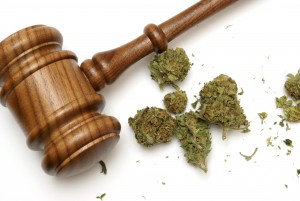The Stigma On Cannabis
The fact that CBS won’t run an ad by a billion-dollar medical cannabis company that employs John Boehner says a lot about the power of stigma.
 Last week, CBS rejected an ad advocating the benefits of medical cannabis during next month’s Super Bowl. The ad was created by the firm Acreage Holdings, a company valued in the billions and which employs former Speaker of the House John Boehner. According to Acreage President George Allen, the ad, which featured a veteran with combat injuries and a child with seizures, was part of an “advocacy campaign for constituents who are being lost in the dialogue.”
Last week, CBS rejected an ad advocating the benefits of medical cannabis during next month’s Super Bowl. The ad was created by the firm Acreage Holdings, a company valued in the billions and which employs former Speaker of the House John Boehner. According to Acreage President George Allen, the ad, which featured a veteran with combat injuries and a child with seizures, was part of an “advocacy campaign for constituents who are being lost in the dialogue.”
In rejecting the ad, CBS was likely doing the NFL a favor, as cannabis prohibition has become something of a bargaining tool with the NFLPA. In any case, CBS’s decision cannot be said to be a reflection of public sentiment, which overwhelmingly supports not only medical use, but also recreational cannabis. But of course, the federal government still prohibits even simple possession of cannabis. Yet for several practical reasons, this federal prohibition is mostly symbolic in states that have legal markets.
Prohibition is symbolic in such instances because Congress has for years now prohibited the Department of Justice from using federal money to prosecute medical cannabis businesses that are legal under state law. Furthermore, it would be extraordinarily difficult to separate medical cannabis businesses from recreational under this framework, given that every recreational shop can plausibly claim they are serving the medical needs of customers. However, as the decision by CBS demonstrates, even symbolic prohibition carries significant power.

The Business Case For AI At Your Law Firm

For example, when former Attorney General Jefferson Beauregard Sessions, a renowned cannabis prohibitionist zealot, rescinded a largely symbolic Obama-era policy that gave cover to cannabis businesses operating in legal state markets, cannabis stocks plummeted. The truth of the matter is, despite overwhelming public support, the stigma surrounding cannabis remains powerfully influential. Most importantly, the stigma exists predominately by those who hold power over the lives of others.
If you want to be both terrified and angry, read Joe Setyon’s piece in Reason detailing the extent that many will go to falsely maintain the stigma regarding cannabis. The list includes a Kansas state legislator who stated that cannabis is illegal because of the “character makeup” and “genetics” of black Americans (sadly, you read that right). Setyon also includes the much-heard story of a police dog trainer in Illinois who tried stoking fear that if cannabis is legalized, “we’ll kill the dogs.” And, lest anyone think the stigma is politically one-sided, Setyon’s piece illustrates how bipartisan cannabis stigma truly is.
Massachusetts Democratic Representative Joe Kennedy stated that legalizing cannabis would make it harder to get around the Fourth Amendment. A New Jersey Democrat in the state Senate appeared to be trying to scare residents when he declared that an influx of sex toys containing cannabis was looming on the horizon and would ensnare kids.
The tragedy of modern reefer madness is that it is likely undercutting the legitimate concerns regarding cannabis legalization. Because when people in positions of authority make speculative and fear-mongering pronunciations regarding cannabis, their credibility is seriously tarnished in the minds of those who may be at most risk of harm.
Sponsored

Is The Future Of Law Distributed? Lessons From The Tech Adoption Curve

The Business Case For AI At Your Law Firm


Navigating Financial Success by Avoiding Common Pitfalls and Maximizing Firm Performance

Navigating Financial Success by Avoiding Common Pitfalls and Maximizing Firm Performance
I have experienced this loss of credibility personally. Like most children my age, I went through the D.A.R.E. Program. I remember vividly when a D.A.R.E. officer declared to my high school class, with a straight face, that smoking a bowl of cannabis was equivalent to smoking two cartons of cigarettes. He may have meant two packs (an equivalency I remembered hearing in the program before), but I’ll never know.
What was certain to me then was after hearing this obviously preposterous statement, that I was not going to listen to anything else this man said. And who is at fault for such loss of trust? I would submit it certainly would not be me. To me, the D.A.R.E officer was clearly more concerned with trying to scare me than inform me, and this fear over facts approach is probably why programs like D.A.R.E. failed.
Obviously, CBS is free to make their own choices about what ads to air on their own network. And obviously, a state or the federal government has the right to prohibit cannabis. But when making the case for prohibition, the government should use evidence, not baseless fear, if an effective prohibitionist system is sought. And stigma alone should not prevent a major company from touting its work with injured vets and sick children during the Super Bowl.
 Tyler Broker is the Free Expression and Privacy Fellow at the University of Arizona James E. Rogers College of Law. His work has been published in the Gonzaga Law Review and the Albany Law Review. Feel free to email him or follow him on Twitter to discuss his column.
Tyler Broker is the Free Expression and Privacy Fellow at the University of Arizona James E. Rogers College of Law. His work has been published in the Gonzaga Law Review and the Albany Law Review. Feel free to email him or follow him on Twitter to discuss his column.
Sponsored

Legal AI: 3 Steps Law Firms Should Take Now








